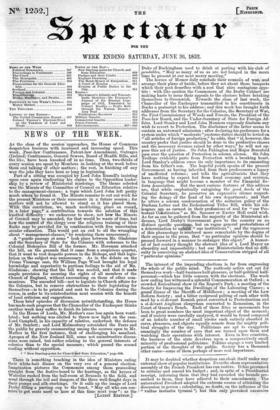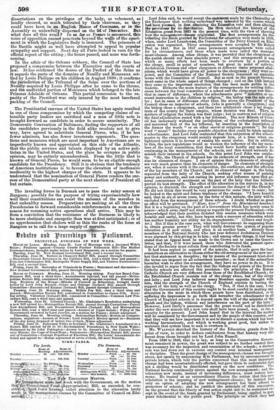It may be doubted whether despotism can cloak itself under
any external show of popular institutions. Eventhe sham representative assembly of the French President has run restive. It has presumed to criticize and amend his budget ; and, in spite of a Presidential rescript, informing them that they had exceeded the bounds pre- scribed to them, they have adhered to their amendments. The autocratical President adopted the extreme course of attending the discussion in person ; calculating, no doubt, on the influence of the " vultus instantis tyranni "; but this only provoked excursive
dissertations on the privileges of the body, as vehement, as loudly cheered, as much tolerated by their chairman, as they could have been in an. English Horse of Commons, or in the Assembly so unlawfully dispersed on the 2d of December. But what does all this avail ? In so far as France is concerned, this voice of opposition cannot penetrate beyond the walls of the apart- ment in which the Legislative Body is immured. The prisoners of the Bastilo might as well have attempted to appeal to popular sympathy and support. Next day all Paris looked in vain for the official report of the sitting ; the hours passed, and none was forth- coming. In the affair of the Orleans robbery, the Council of State has proposed a compromise between the Executive and the courts of law. It has confirmed the decree of the Prefect of the Seine as it regards the parts of the domains of Nenilly and Monceaux set- tled by Louis Philippe on his children in August 1830; it confirms the jurisdiction of the Tribunal of the Seine over the portions of Neuilly acquired by Louis Philippe after he came to the throne, and the undivided portion of Monceaux which belonged to the late Princess Adelaide of Orleans. This partial concession to the ra- pacity of the President was only insured by the moat barefaced packing of the Council.



























 Previous page
Previous page